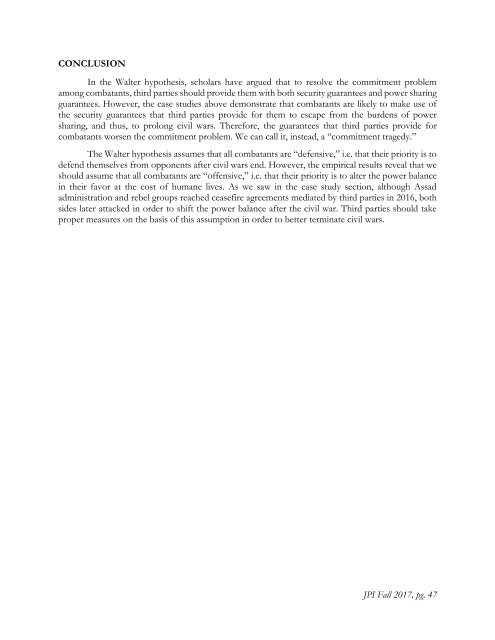for the resignation of President Assad. 21 On the same day, EU countries also demanded his resignation. 22 Then on September 2, the EU decided to ban all imports of Syrian oil. 23 At the time, the United States and Russia could not reach any agreements that enabled them to provide both security and power-sharing guarantees for the Assad administration and Syrian rebels. Meanwhile, on June 3, 2012, president Assad officially declared that he had decided to use military forces instead of policemen and secret services to repress the rebel groups. 24 This is how a civil war broke out in a full scale in Syria. On January 2, 2013, the Syrian Observatory for Human Rights, an NGO based in London, announced that more than 60,000 people had been killed since anti-government demonstrations began in 2011. 25 [Term II: From September 2016 on] The five permanent members of the UN Security Council, EU representatives, and the League of Arab States issued a joint communiqué on June 30, 2012. 26 This was the point when third parties started working closely together to settle the civil war in Syria. Due to the ongoing Geneva Peace Talks that had continued in several iterations between 2012-2016, on February 23, 2016, the Syrian government and a major opposition group announced that they would observe a conditional pause in the fighting. 27 However, on April 19, 2016, government warplanes attacked a crowded market in the northwestern Syrian town of Maarat al- Noaman, killing dozens of people. 28 This attack illustrated the fragility of the conditional agreements to stop fighting between Syrian government forces and some armed opposition groups. After intensified fighting and a vow by Bashar al-Assad to retake the entire country, a ceasefire negotiated by Russia and the United States officially took effect on September 12, 2016. 29 However, on September 19, a humanitarian aid convoy was attacked. 30 As a result, the Syrian military declared that a seven-day partial ceasefire was over and immediately began intensive bombardments of rebelheld areas in Aleppo. These cases in Syria provide significant support for my model. When third parties do not provide either security or power-sharing guarantees for combatants, a full-scale civil war breaks out; yet, when third parties provide both of the guarantees, ceasefire agreements are short-lived. 21 Colum Lynch, “U.N. Blasts Syrian Leaders on Human Rights,” The Washington Post (August 18, 2011). https://www.washingtonpost.com/blogs/checkpoint-washington/post/un-blasts-syrian-leaders-on-humanrights/2011/08/18/gIQAvduBOJ_blog.html?utm_term=.d6278eede847. 22 Steven Lee Myers, “U.S. and Allis say Syria Leader Must Step Down,” The New York Times (August 18, 2011). http://www.nytimes.com/2011/08/19/world/middleeast/19diplo.html. 23 Nada Bakri and Steven Erlanger, “E.U. Bans Syrian Oil as Protests Continue,” The New York Times (September 2, 2011). http://www.nytimes.com/2011/09/03/world/middleeast/03syria.html. 24 Alexander Valiente, “President Assad’s Speech, on June 3, 2012,” Syria 360: Reporting On Events in Syria and the Middle East. https://syria360.wordpress.com/2012/06/03/president-assads-speech-june-3-2012/. 25 Syrian Observatory for Human Rights, “Killing Continues in Syria,” (March 1, 2013). http://www.syriahr.com/en/?p=3656. 26 http://www.un.org/News/dh/infocus/Syria/FinalCommuniqueActionGroupforSyria.pdf; Nick Cumming-Bruce and Rod Nordland, “Talks Come Up With Plan for Syria, but Not Assad’s Exit,” The New York Times (June 30, 2012).http://www.nytimes.com/2012/07/01/world/middleeast/futureof-syria-on-agenda-as-countries-gather-in-geneva.html. 27 Anne Barnard, “Syrian Government and Rebel Group Agree to Partial Cease-Fire,” The New York Times (February 23, 2016). https://www.nytimes.com/2016/02/24/world/middleeast/government-in-syria-and-main-opposition-agree-to-partial-and-conditional-truce.html. 28 Anne Bernard, “Syria Cease-Fire Crumbles as Bombings Kills Dozens,” The New York Times (April 19, 2016). https://www.nytimes.com/2016/04/20/world/middleeast/syria-cease-fire.html. 29 Anne Bernard and Rick Gladstone, “Syria is Calmer, but Cautious as Cease-Fire Begins,” The New York Times (September 12, 2016). https://www.nytimes.com/2016/09/13/world/middleeast/hours-before-cease-fire-assad-vows-to-recover-every-area-in-syria.html. 30 Anne Bernard and Michael R. Gordon, “Aid Convoys is Hit in Syria as Cease-Fire Falters and Bombings Resume,” The New York Times (September 19, 2016). https://www.nytimes.com/2016/09/20/world/middleeast/syria-aid-john-kerry.html. <strong>JPI</strong> Fall 2017, pg. 46
CONCLUSION In the Walter hypothesis, scholars have argued that to resolve the commitment problem among combatants, third parties should provide them with both security guarantees and power sharing guarantees. However, the case studies above demonstrate that combatants are likely to make use of the security guarantees that third parties provide for them to escape from the burdens of power sharing, and thus, to prolong civil wars. Therefore, the guarantees that third parties provide for combatants worsen the commitment problem. We can call it, instead, a “commitment tragedy.” The Walter hypothesis assumes that all combatants are “defensive,” i.e. that their priority is to defend themselves from opponents after civil wars end. However, the empirical results reveal that we should assume that all combatants are “offensive,” i.e. that their priority is to alter the power balance in their favor at the cost of humane lives. As we saw in the case study section, although Assad administration and rebel groups reached ceasefire agreements mediated by third parties in 2016, both sides later attacked in order to shift the power balance after the civil war. Third parties should take proper measures on the basis of this assumption in order to better terminate civil wars. <strong>JPI</strong> Fall 2017, pg. 47
















